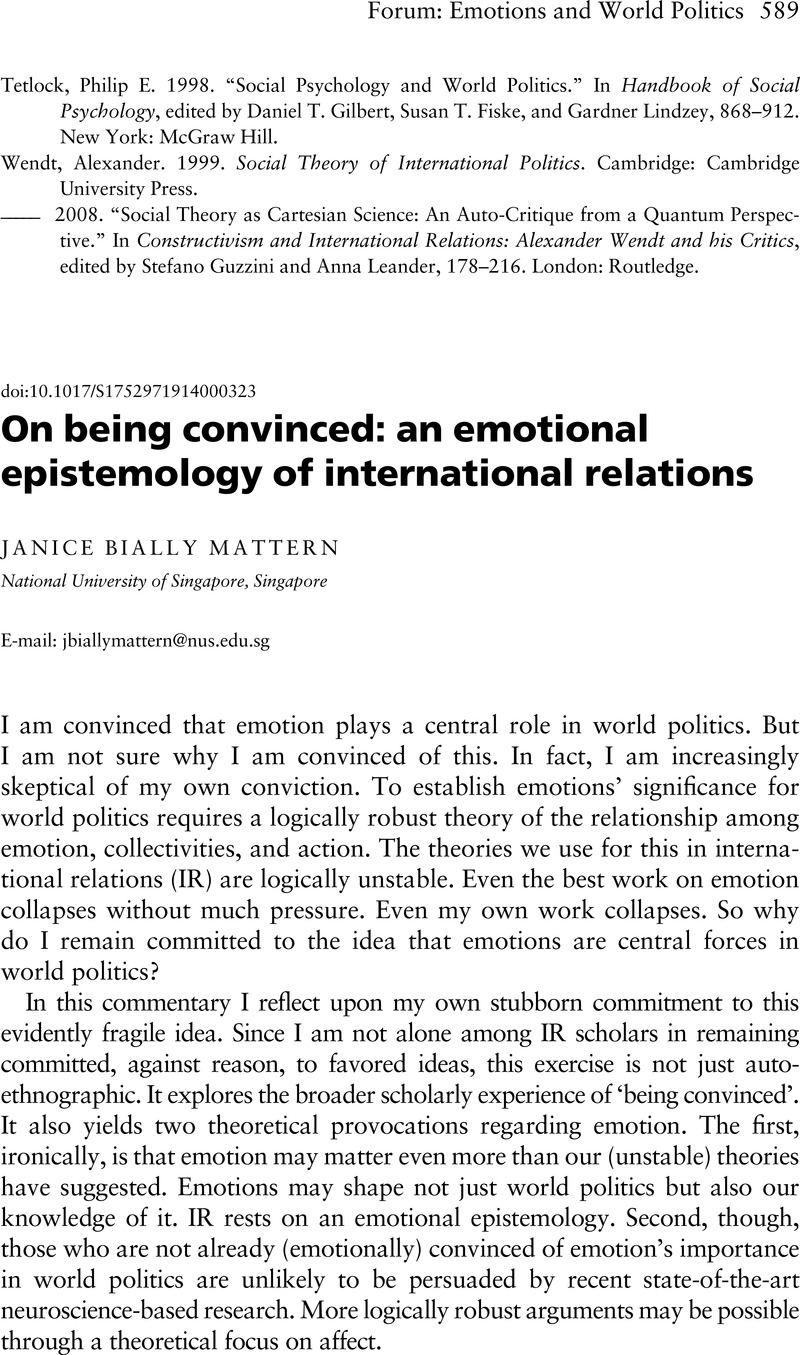Crossref Citations
This article has been cited by the following publications. This list is generated based on data provided by Crossref.
Hutchison, Emma
and
Bleiker, Roland
2014.
Theorizing emotions in world politics.
International Theory,
Vol. 6,
Issue. 3,
p.
491.
Branch, Jordan
2016.
How should states be shaped? Contiguity, compactness, and territorial rights.
International Theory,
Vol. 8,
Issue. 1,
p.
1.
Holmes, Marcus
and
Yarhi-Milo, Keren
2016.
The Psychological Logic of Peace Summits: How Empathy Shapes Outcomes of Diplomatic Negotiations: Table 1..
International Studies Quarterly,
p.
sqw034.
2016.
Affective Communities in World Politics.
p.
1.
Branch, Jordan
2016.
Geographic Information Systems (GIS) in International Relations.
International Organization,
Vol. 70,
Issue. 4,
p.
845.
Solomon, Ty
and
Steele, Brent J.
2017.
Micro-moves in International Relations theory.
European Journal of International Relations,
Vol. 23,
Issue. 2,
p.
267.
Branch, Jordan
2017.
Territorial Conflict in the Digital Age: Mapping Technologies and Negotiation.
International Studies Quarterly,
Vol. 61,
Issue. 3,
p.
557.
Koschut, Simon
Hall, Todd H.
Wolf, Reinhard
Solomon, Ty
Hutchison, Emma
and
Bleiker, Roland
2017.
Discourse and Emotions in International Relations.
International Studies Review,
Vol. 19,
Issue. 3,
p.
481.
Gabay, Clive
and
Ilcan, Suzan
2017.
The Affective Politics of the Sustainable Development Goals: Partnership, Capacity-Building, and Big Data.
Globalizations,
Vol. 14,
Issue. 3,
p.
468.
Clément, Maéva
and
Sangar, Eric
2018.
Researching Emotions in International Relations.
p.
1.
Koschut, Simon
2018.
No sympathy for the devil: Emotions and the social construction of the democratic peace.
Cooperation and Conflict,
Vol. 53,
Issue. 3,
p.
320.
Schlag, Gabi
2018.
Researching Emotions in International Relations.
p.
209.
Bleiker, Roland
and
Hutchison, Emma
2018.
Researching Emotions in International Relations.
p.
325.
Ilgit, Asli
and
Prakash, Deepa
2019.
Making Human Rights Emotional: A Research Agenda to Recover Shame in “Naming and Shaming”.
Political Psychology,
Vol. 40,
Issue. 6,
p.
1297.
Duncombe, Constance
2019.
The Politics of Twitter: Emotions and the Power of Social Media.
International Political Sociology,
Vol. 13,
Issue. 4,
p.
409.
Lynggaard, Kennet
2019.
Methodological Challenges in the Study of Emotions in Politics and How to Deal With Them.
Political Psychology,
Vol. 40,
Issue. 6,
p.
1201.
Kumral, Mehmet Akif
2020.
Exploring Emotions in Turkey-Iran Relations.
p.
307.
Gammon, Earl
2020.
Affective neuroscience, emotional regulation, and international relations.
International Theory,
Vol. 12,
Issue. 2,
p.
189.
Levy, Aviad
2020.
Understanding international Schadenfreude: the pains of Europe as a protective shield of the Israeli self-perception.
Journal of International Relations and Development,
Vol. 23,
Issue. 4,
p.
996.
Faraoun, Ahlem
2021.
Mimetic Desire and Ressentiment in the Case of the Japan–South Korea Trade Dispute.
European Journal of Korean Studies,
p.
251.





